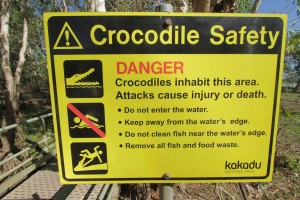Personal Safety
Despite popular misconception, not every plant and animal in Australia is trying to kill you. However, it is always sensible to be careful when dealing with unknown flora and fauna. This is true for Australia as it is for the United States. Imagine the pitfalls a nature tourist in the US could experience if they were unaware of poison ivy and oak, snakeroot, nightshade berries, cottonmouths, snapping turtles, alligators, brown recluses, black widows, mountain lions, or grizzly bears. You should follow a few simple rules when dealing with wildlife and plants in Australia:
- don’t go near, attempt to catch, or touch ANY snake, reptile, or spider (unless your instructor has asked you to…)
- don’t touch flowers, thorns, sap, pollen, or anything “sticky” on a plant unless advised to do so
- don’t touch ANYTHING or ANYONE on the Great Barrier Reef dive. Reef organisms are beautiful and delicate – and many of them cannot move or escape so they will defend themselves with toxins, stingers, etc.
- DO NOT drink the water out of streams or rivers, no matter how pristine it looks – EVEN if your local guide does it! That crystal clear mountain stream was probably just used as a bathroom by some upstream marsupial.
- don’t eat any mushrooms, berries, or fruit in the wild no matter how safe or delicious they appear
- wildlife is WILD. You might think it cuddly and cute but it does almost CERTAINLY NOT think the same of you! Actually, most wildlife very likely thinks that you are ugly, smelly, disturbing, and generally terrifying – just keep that in mind. How do you think you would react if something like that was coming at you?
- never go swimming on a beach UNLESS it has been deemed safe by local authorities. DO NOT assume that because a handful of people are in the water that this means the beach is safe to swim on.
- stay away from the edge of freshwater lakes and rivers, especially in the Northern Territory and Queensland. Saltwater crocodiles make these their winter homes when seasonal floods end and local rivers dry out.
Heed ALL Warning Signs
As Americans we are used to the ubiquity of warning signs. Unfortunately, in the US we have reached a point at which such signs are present for liability reasons and not necessarily due to the presence of a real threat. They are so common and overused, we tend to downplay their meaning and importance, and ignore them. THIS IS NOT SO IN AUSTRALIA. Heed all warning signs and take them serious! When Australians have deemed it necessary for a warning sign to be put up, they mean it!

Beaches and estuaries in Darwin, Cape Tribulation, and Cairns ARE NOT FOR SWIMMING!!! This is estuarine crocodile country! When walking along the beach ALWAYS keep at least 20 feet between you and the water’s edge. When laying out on the beach, keep at least 100 feet between you and the water’s edge and always keep your eyes on your surroundings (including the forest edge behind you). In the Northern Territory and Queensland, estuarine (saltwater) crocodiles can inhabit freshwater rivers, well inland. Due to seasonal flooding, some of these creatures also make it into freshwater lakes where they will “annoy” the local freshwater crocodile population (the latter is comparatively timid and humans are not on their menu). Australians have a saying about crocodiles: “It’s not the crocodile in front of you that eats you, but the one you don’t even see!” Want “proof” that we are not being unnecessarily cautious and overly dramatic? Here are some recent news articles that should convince you: here (May 30th, 2016), here (January 20th, 2017), here (March 19th, 2017), here (March 21st, 2017), here (October 17th, 2017), here (October 12th, 2018), here (February 23, 2023), here (May 4th, 2023), here (July 11, 2023), here (January 15th, 2024), and here (April 22nd, 2024).
Remember that crocodiles are expert ambush predators and they have honed this skill since the Triassic, for well over 200 million years! Your sense of your surroundings is the result of a few million years of evolution and has been greatly stunted in favor of other, primarily, cultural and community-living skills. You may think that you can outsmart a crocodile, but alas, SMARTS has NOTHING to do with this fight….
SO BE CROCWISE!
